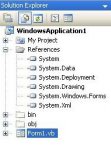Brainbug
Member
Hi,
is it possible for, say, really small projects which use barely any fency controls, to distribute (and run) WITHOUT any use of the .net framework? - Maybe there is a way to put the used controls and whatever in a single dll-file or something which allows the program to run without necessarily the 20 MB framework to be installed?
Would really like some hints about that, sucks to have to force the user to download that huge framework for a small application of 20kB ...
Thanks,
Brainbug
is it possible for, say, really small projects which use barely any fency controls, to distribute (and run) WITHOUT any use of the .net framework? - Maybe there is a way to put the used controls and whatever in a single dll-file or something which allows the program to run without necessarily the 20 MB framework to be installed?
Would really like some hints about that, sucks to have to force the user to download that huge framework for a small application of 20kB ...
Thanks,
Brainbug

